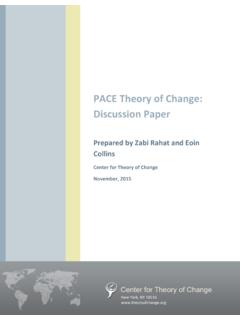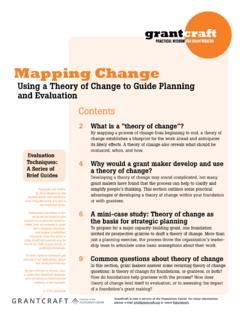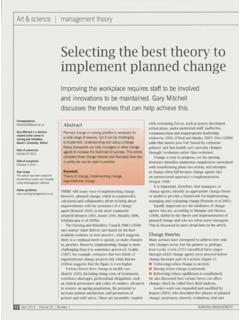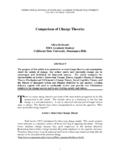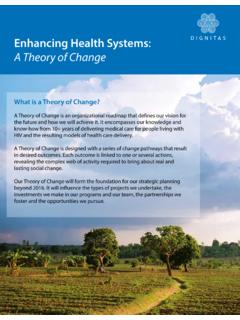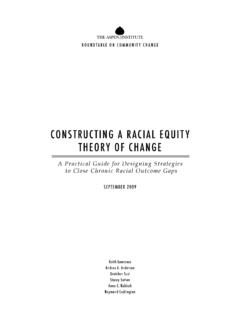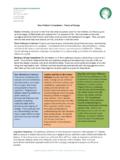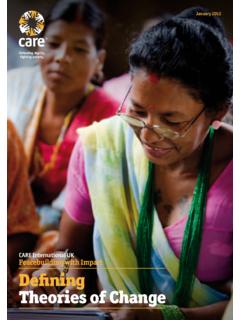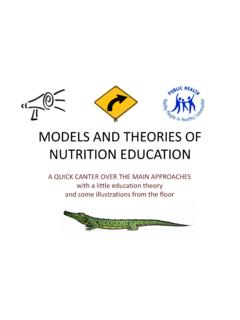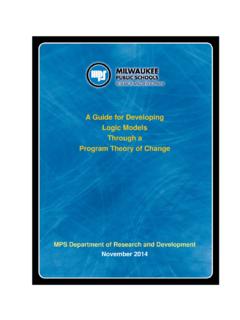Transcription of THEORY OF CHANGE REVIEW - ActKnowledge
1 THEORY OF CHANGE REVIEW A report commissioned by Comic Relief Cathy James September 2011 Comic Relief s Vision is A Just World Free From Poverty Comic Relief does three things. It raises much needed cash, it then allocates that cash to projects here at home and in the poorest countries in the world, and it raises awareness of the issues it feels strongly about. This report is one of a series of Comic Relief commissioned learning reports. Some learning reports aim to bring the impact of and learning from some of the work Comic Relief has funded in helping CHANGE lives to a wider audience. Other reports aim to draw together learning on key issues from a range of stakeholders to inform Comic Relief s thinking and promote debate in the sector.
2 This report aims to draw together Comic Relief staff and partners experiences in using THEORY of CHANGE ; to identify others in development that are using THEORY of CHANGE and analyse their different approaches and experience; and to capture learning from everyone to promote debate, and to help inform what agencies using or advocating for the use of THEORY of CHANGE do next. This report was commissioned by Comic Relief and written by Cathy James, an independent consultant. The views expressed in this report are those of the author and do not necessarily represent the views of Comic Relief. EXECUTIVE SUMMARY Introduction THEORY of CHANGE is nothing new, according to this REVIEW .
3 Yet it can provide a very powerful learning lens, which helps organisations ask themselves and others simple but important questions about what they are doing and why. It enables them to develop a clear framework for monitoring and evaluation; more common understanding, clarity and effectiveness in their approach; and strengthen their partnerships, organisation development and communication. This REVIEW defines THEORY of CHANGE as follows: An ongoing process of reflection to explore CHANGE and how it happens and what that means for the part organisations play in a particular context, sector and/or group of people. It locates a programme or project within a wider analysis of how CHANGE comes about.
4 It draws on external learning about development. It articulates organisations understanding of CHANGE but also challenges them to explore it further. It acknowledges the complexity of CHANGE : the wider systems and actors that influence it It is often presented in diagrammatic form with an accompanying narrative summary The REVIEW approach Comic Relief s international grants team commissioned this REVIEW of existing literature and experience on THEORY of CHANGE to identify who is using THEORY of CHANGE ; analyse their different approaches and capture a range of experiences in using it; and to draw together learning from everyone to inform Comic Relief and the wider sector.
5 The REVIEW combined analysis of literature with 32 short interviews of people with experience and knowledge of THEORY of CHANGE . The literature included reports, guidelines, study notes, THEORY of CHANGE examples and other relevant documents. The REVIEW included interviews with members of Comic Relief s international grants team; Comic Relief grant partners (both UK and southern organisations); freelance consultants; UK organisation development consultants and researchers; North American research organisations, consultancy groups and foundations; International Non-governmental organisations (INGOs); and academics. What are the origins of THEORY of CHANGE ? People have long explored theories of social CHANGE , debating what leads to development and how that influences the approach organisations take.
6 The Brazilian educator, Freire, specifically advocated in the 1970s helping people to surface their beliefs about poverty and how to address it, then reflect and take action. He saw this as an empowering process in itself. Development organisations and practitioners are all, consciously or unconsciously, development theorists, drawing on macro theories of development as frameworks for action. More recently, evaluators of complex programmes have urged a more explicit analysis of underlying theories of CHANGE , finding it difficult to evaluate programmes that are not clear about what they set out to do and why. In the 1990 s a number of writers challenged programmes to articulate the changes they wanted to achieve and what needed to happen to reach them.
7 The Aspen Research Institute s Roundtable on Community CHANGE teamed up with ActKnowledge , an independent research and capacity building organisation in New York, to produce the first THEORY of CHANGE guidelines. ActKnowledge went on to develop its THEORY of CHANGE process and website. Who is using THEORY of CHANGE ? More and more INGOs, foundations and evaluators in North America, Europe and Australia have started to use THEORY of CHANGE as an approach. Increasing pressure from organisations boards and funders to articulate long-term impact has caused many to look for how to represent what they do. They want to find ways to explore and represent CHANGE that reflect more complex and systemic understanding of development, rather than portraying a linear process.
8 Others have carried out internal reflections and impact studies that led them to recognise that people in their organisations have very different understandings and approaches to generating social CHANGE . Some funders, organisation development providers and consultants have also started to use THEORY of CHANGE to help NGOs focus more on CHANGE , rather than just activity; and to help them to direct their energies more clearly. Most of the southern organisations using THEORY of CHANGE (identified in the REVIEW ) began because of a funder s influence or because they are affiliated to an international organisation. How is Comic Relief using THEORY of CHANGE ? The REVIEW also summarised how Comic Relief s own interest in THEORY of CHANGE evolved.
9 In developing a learning strategy, Comic Relief identified the importance of understanding both what changes it is helping to bring about and also how those changes happen. As Comic Relief began making larger, more complex grants, it saw that grantees were not always explicit about what changes they would contribute to and how CHANGE would come about. Comic Relief impact studies on specific grants programmes in 2008-9 recommended a need to identify more clearly the desired changes in people s lives, track more systematically progress towards those changes and analyse better the factors that contribute to CHANGE for particular groups of people. Since that time Comic Relief has developed programme strategies that articulate some of its key beliefs about how CHANGE happens for a group of people.
10 It has also facilitated a number of THEORY of CHANGE processes with individual partners and sometimes with groups of partners. It has also asked other large grant-holders to articulate their THEORY of CHANGE . There is some evidence of how THEORY of CHANGE processes have strengthened organisations and programmes, some quite dramatically. However, there is a recognition that THEORY of CHANGE should not become just another donor hoop to jump through. What benefits can THEORY of CHANGE bring? People and organisations that contributed to this REVIEW highlighted a large number of benefits that can emerge from using THEORY of CHANGE as an approach though not everyone will experience them all.
